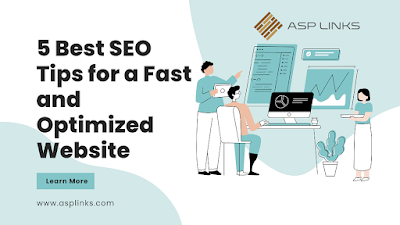Introduction
In today's digital age, having a fast and optimized website is crucial for success. With the increasing competition online, it's essential to ensure that your website stands out and attracts organic traffic. Search Engine Optimization (SEO) plays a pivotal role in achieving this goal. By implementing effective SEO strategies, you can improve your website's visibility on search engines and drive more targeted visitors to your site. In this article, we will explore the five best SEO tips for creating a fast and optimized website that will help you boost your online presence and attract more organic traffic.
1. Conduct Keyword Research
Keywords are the foundation of any successful SEO strategy. Proper keyword research enables you to understand what terms and phrases your target audience is using to find information related to your business. Start by brainstorming a list of potential keywords that are relevant to your website's content. Then, use keyword research tools like Google Keyword Planner or SEMrush to identify high-volume, low-competition keywords that you can target. Incorporate these keywords naturally into your website's content, including headings, subheadings, and body text, to improve your website's search engine rankings.
2. Optimize Page Titles and Meta Descriptions
Page titles and meta descriptions are crucial elements for optimizing your website's visibility on search engine results pages (SERPs). A compelling page title that includes your target keyword helps search engines understand the relevance of your content. Additionally, a well-crafted meta description provides a concise summary of your webpage and encourages users to click through to your site. Ensure that your page titles and meta descriptions accurately represent your content and entice users to visit your website.
3. Improve Website Loading Speed
Website loading speed is a critical factor that impacts both user experience and search engine rankings. Users expect fast-loading websites, and search engines prioritize sites that provide a seamless browsing experience. To improve your website's loading speed, consider compressing images, minifying CSS and JavaScript files, leveraging browser caching, and using a content delivery network (CDN). These optimizations will reduce the page load time, making your website more user-friendly and search engine friendly.
4. Optimize Images
Images are an essential part of web content, but they can also impact your website's loading speed if not optimized correctly. Compressing images without compromising their quality is crucial for a fast and optimized website. Use image compression tools or plugins to reduce the file size of your images. Additionally, add descriptive alt tags to your images, including relevant keywords, to provide search engines with context and improve your website's accessibility.
5. Create High-Quality and Engaging Content
Creating high-quality and engaging content is key to attracting and retaining visitors to your website. When search engines crawl your site, they assess the quality and relevance of your content. Develop well-researched articles, blog posts, and landing pages that provide value to your target audience. Incorporate your target keywords naturally throughout the content while ensuring readability and avoiding keyword stuffing. By consistently producing valuable content, you can establish yourself as an authority in your industry and improve your website's visibility in search engine results.
Frequently Asked Questions (FAQs)
1. What is SEO?
SEO stands for Search Engine Optimization. It refers to the practice of optimizing a website to improve its visibility and rankings on search engine results pages (SERPs). The goal of SEO is to attract organic (non-paid) traffic by ensuring that the website appears higher in search engine rankings when users search for relevant keywords or phrases.
2. How long does it take to see results from SEO efforts?
The time it takes to see results from SEO efforts can vary depending on various factors, including the competitiveness of the keywords, the quality of the website's content, and the effectiveness of the SEO strategies implemented. Generally, it takes several months to start seeing significant improvements in search engine rankings and organic traffic. SEO is an ongoing process that requires continuous optimization and monitoring.
3. Are backlinks important for SEO?
Yes, backlinks are an essential aspect of SEO. Backlinks are links from other websites that direct users to your website. Search engines consider backlinks as a vote of confidence in your website's credibility and relevance. High-quality backlinks from reputable and authoritative websites can significantly impact your search engine rankings and improve your website's visibility.
4. Should I prioritize mobile optimization for my website?
Absolutely! Mobile optimization is crucial for a fast and optimized website. With the increasing use of smartphones and tablets, a significant portion of internet traffic comes from mobile devices. Search engines prioritize mobile-friendly websites in their rankings, and a poor mobile experience can result in higher bounce rates and lower search engine rankings. Ensure that your website is responsive and provides a seamless experience across different screen sizes and devices.
5. How often should I update my website's content?
Regularly updating your website's content is beneficial for both users and search engines. Fresh and relevant content can attract more organic traffic and encourage visitors to spend more time on your site. Additionally, search engines consider frequently updated content as a positive signal of a website's relevance and credibility. Aim to publish new content consistently, whether it's through blog posts, articles, or product updates, to keep your website dynamic and engaging.
Conclusion
Creating a fast and optimized website is essential for improving your online visibility and attracting organic traffic. By implementing the five best SEO tips mentioned in this article, you can optimize your website effectively and enhance your chances of ranking higher in search engine results. Remember to conduct thorough keyword research, optimize page titles and meta descriptions, improve website loading speed, optimize images, and create high-quality and engaging content. By prioritizing these aspects of SEO, you can take significant strides towards improving your website's performance and achieving your online goals.





0 Comments